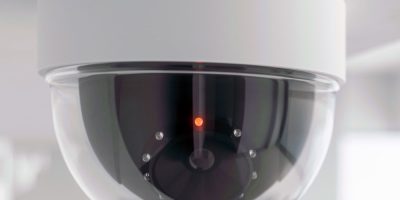Low power IR sensor can replace passive IR detectors
Designed to enhance security systems, home automation equipment and IoT devices that typically use passive infrared (PIR) sensing, the STHS34PF80 is a novel human presence and motion detector, said STMicroelectronics.
The STHS34PF80 sensor contains thermal transistors that can detect stationary objects, whereas conventional PIR detectors require a detected object to be moving to produce a measurable response from the sensor. Conventional PIRs also need a Fresnel lens to sense moving objects, but the STHS34PF80 detector allows a simpler, lens-free construction.
The STHS34PF80 contains thermal MOSFETs (TMOS) that are sensitive to the heating effects of IR radiation incident on their gates, as well as digital readout circuitry integrated on the same chip using ST’s silicon-on-insulator (SOI) CMOS technology. The SOI’s architecture facilitates micromachining with ST’s MEMS processes to thermally isolate the TMOS for accurate temperature sensing.
The TMOS is powered at a sub-threshold voltage below that needed to turn the transistor fully on. In this mode, the drain-source current is highly temperature dependent and produces an accurately measurable response to minimal IR radiation allowing the sensor to detect human presence whether the person is moving or still.
Sub-threshold operation also means that the transistor consumes very low power, allowing long periods between charging or battery replacement for battery powered sensors fitted with the STHS34PF80.
According to Simone Ferri, general manager, AMS MEMS sub-group, STMicroelectronics, the STHS34PF80 has been creating using a combination of CMOS chip fabrication, silicon micromaching and low voltage circuit design to result in “an economical, ultra-low power sensor that lets building automation operate consistently whether detected occupants are moving or not”.
A smart algorithm for presence and motion detection is embedded in the STHS34PF80 making it suitable for alarms and security systems, home automation, smart lighting, IoT devices, smart lockers and smart wall pads. The lens-free range of four meters and 80 degree field of view cover a large area in front of the sensor.
Operating current is 10microA, for power consumption which is less than a conventional PIR, reported ST. The sensor is supplied in a compact 3.2 x 4.2 x 1.455mm surface mount package which is suited to automated high speed assembly. The sensor has high resistance to unwanted effects of direct lighting and high immunity to EMI, added ST.
According to ST, the standard CMOS fabrication technology ensures cost-effective sensor production with high wafer yield, while also leveraging sub-micron transistor geometry for small sensor dimensions. In comparison, PIR sensors’ sensitivity can depend on pyroelectric-pixel size. The STHS34PF80’s integrated digital interface allows direct connection to the host without analogue front end circuitry.
An evaluation board, the STEVAL-MKI231KA is available for the STHS34PF80. Developers can plug into the X-NUCLEO-IKS01A3 or the STEVAL-MKI109V3 and use ST’s Unico-GUI to configure the IR sensor and take measurements within a simplified workflow. Drivers for the STHS34PF80 are available on GitHub. There is also a library for compensating and detecting presence of people or objects in the X-CUBE-MEMS1 software package.
The STHS34PF80 is in production now and available in a 10-lead land-grid array (LGA) package.




